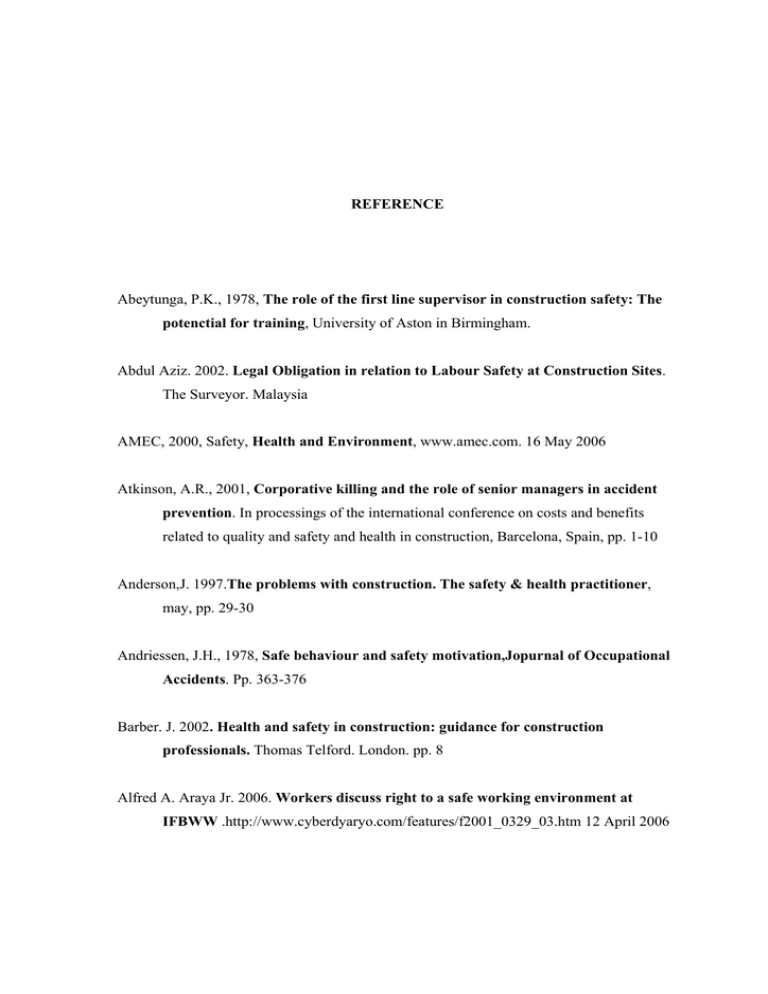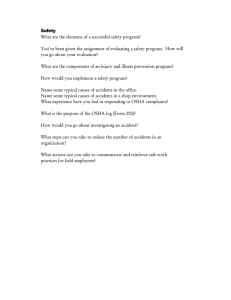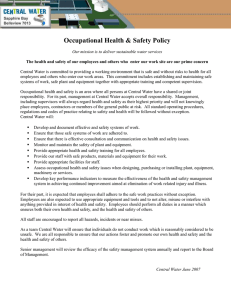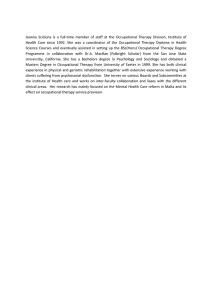REFERENCE potenctial for training
advertisement

REFERENCE Abeytunga, P.K., 1978, The role of the first line supervisor in construction safety: The potenctial for training, University of Aston in Birmingham. Abdul Aziz. 2002. Legal Obligation in relation to Labour Safety at Construction Sites. The Surveyor. Malaysia AMEC, 2000, Safety, Health and Environment, www.amec.com. 16 May 2006 Atkinson, A.R., 2001, Corporative killing and the role of senior managers in accident prevention. In processings of the international conference on costs and benefits related to quality and safety and health in construction, Barcelona, Spain, pp. 1-10 Anderson,J. 1997.The problems with construction. The safety & health practitioner, may, pp. 29-30 Andriessen, J.H., 1978, Safe behaviour and safety motivation,Jopurnal of Occupational Accidents. Pp. 363-376 Barber. J. 2002. Health and safety in construction: guidance for construction professionals. Thomas Telford. London. pp. 8 Alfred A. Araya Jr. 2006. Workers discuss right to a safe working environment at IFBWW .http://www.cyberdyaryo.com/features/f2001_0329_03.htm 12 April 2006 Allen, J.D. 1999, Measuring performance. Construction Manager, May, pp. 18 Ball,M., 1988, Rebuilding Construction: Economic Change in the British Construction Industry. London. Back, W. and Woolfson,C., 1999, Safety culture – A concept too many? Health and safety practitioner, Janurary, pp. 14-16 Barber, J. 2002. Health and safety in construction, Thomas Telford Publishing. London. pp. 2 Bentil, K., 1990, The impact of construction related accidents on the cost and productivity of building construction projects. In proceedings of the CIB 90, 6, Management of the Building Firm, Sydney. Bernama Press. Workplace Accidents Must Be Reduced Further. 3 January 2006 Boom, J., 1999, Trenching is a dangerous and dirty business. OSHA’s Job Safey and Health Quarterly magazine, 11, 1, Fall. Bomel. Ltd, 2001, Improving Health and Safety in Construction, Phase 1: Data Collection, Review and Structuring, Contract Research Report 386/2001 CIRIA, 1991, Roles Responsiblities and Risks in Management Contracting, Special Publication 81. London Cooper, K.G., 1993, The rework cycle: Benchmarks for the project manager. Project management journal, 24, 1 , pp.100-111. Cooper.M.D. 1998, Improving Safety Culture: A Practical Guide. J.Wiley and Sons. London. Coble, R.J. and Blatter, Jr. R.L., 1999, Concerns with safety in design-build process, American Society of Civil Engineers. Journal of Architectural Engineering, June, pp. 44-48 Coote,J.A. 1993. Employee Perceptions of Safety at Sellafield: Initial Results of the Safety Survey carried out in 1991/92 BNFL Cotton, P., 1995, Psychological Health in the workplace: Understanding and managing occupational stress. Melibourne:Australian Psychological Society. David L. 2002. Construction Safety and Health. Prentice Hall. New Jersey. pp. 3 Eckenfelder, D.J.,1997, it’s the culture stupid. Occupational Hazards. June 1997. pp. 41-44 Dester,W.S. 1995, Safety, behaviour and culture in construction. Engineering. Construction and Architectural Management, 1, pp. 19-26 Donald. S. 1990. Professional Construction Management. McGraw-Hill Book Company. United States. D'Sa, A. A. J. Barros. 1996. Professional liability and construction/ A A J Barros D'Sa. Ascot, Berkshire : The Chartered Institute of Building, pp- 56 Erickson, J.A, 1997, The relationship between corporate safety culture and performance, Professional Safety., ASSE, May 1997, pp. 29-33 Financial Times, 1993, Building and Development Economics in the EC, Report David L. Goetsch. 2000. Construction safety and health. Prentice Hall. New Jersey,. pp153 Dester, W.S. 1995. Safety, behaviour and culture in construction. Engineering, Construction and Architectural management, 1, pp 19-26 Donald. S. 1984. Professional Construction Management. United States. pp. 374 Douglas,M. and Wildavsky, A., 1982, Risk and Culture, University of California. Eckenfelder, D.J.,1997, it’s the culture stupid. Occupational Hazards. June 1997. pp. 41-44 Egan,J.,1998, Rethinking Construction (HMSO) Equipment World, 1998, Digging Deeper: Surve4y on Trench Shoring Practice. Frayer, B., 1995, The Practise of Construction Management (London: Collins) Fellner,D.J. 1984, Increasing Industrial safety practices and conditions through posted feedback. Journal of Safety Research, 15, pp. 7-21. Financial Times, 1993, Building and Development Economics in the EC, Report. Frederick E. 2002. Construction Project Management. Professional Edition. Prentice Hall. New jersey. pp. 373-374 Gyi,D.E., Haslam, R.A. and Gibb, A.G.F., 1988, Case studies of occupational health management in the engineering construction industry. Occupational Medicine, 48, 4, pp. 263-271, ISSN 0962 7480/98 Health and safety commission, 1993, ACSNI Human Factors Study Group Third Report, Organising for safety (London:HMSO) Herns, A.B. and Bryant, D.T., 1984, Studying the client’s role in construction management. Construction Management Economics, 2, 177-184. Herns, A.B. and Bryant, D.T., 1984, Studying the client’s role in construction management. Construction Management Economics, 2, 177-184. H.G. Dyktor. 1940. Integration of Industrial Hygiene with Industrial Medicine. Industrial Medicine. Vol. 9. No.4, 193. Hinze,J. 1997, Construction Safety. New Jersey: Prentice-Hall. Hinze, j., Raboud, P., 1988, Safety on large building construction projects. Journal of Construction Engineering and Management, ASCE, 114, pp. 286-293 Hinze, J., 1981, Human Aspects of Construction Safety. Journal of the Construction Division, ASCE, 107, pp. 61-72 Hislop, R.D., 1999, Construction Site Safety – A guide for managing contractors, Florida, Lewis Pubilishers, Boca Raton. Holyoak, J. 1992. Negligence in building law: cases and commentary. London: Blackwell Scientific Pub.pp-137 Jannadi, O.A. and Bu-khamsin, M.S., 2002, Safety factors considered by industrial contractors in Saudi Arabia. Safety Science, 29, 1, pp. 15-24 Josepth, A.J. 1999. Safety costs money and can save money. The Egan Report. Justin.S. 2004. Legal Aspect of architecture, engineering and the construction process. Thimson Ltd. pp- 66 Kartam, N., 1997, Integrating safety and health performance into construction CPM. Journal of Construction Engineering and Management, June, 123, 2, pp. 121-126 Kennedy. G. 1997. Cosntruction Foreman’s Safety Handbook. Delmar Publishers. London. pp. 7 Laney, J.c.,1982, Site Safety, London and New York: Cosntruction Press. Laufer, A. and Ledbetter, W.B., 1986, Assessment of safety performance measures at construction sites. Journal of Construction Engineering and management, 112, 4, pp. 530-542 Leopold E. and Leonard, S., 1987, Costs of construction accidents to employers, Journal of Occupational Accidents, 8, pp. 273-294 Levitt, A.M. and Parker, H.W., 1976, Reducing construction accidents: Top management’s role. Journal of the construction division, ASCE, 102, 3 September. Lewis. J.R. 1980. Law for the construction Industry. The Macmillan Press Ltd. New York. Lingard,H. and Rowlinson, S., 1998, Behaviour based safety management in construction industry. Construction and economics, 16, pp.481-488. Marler,J. 2000, Construction Partners, Local Government News, April, 2000. Mattila,M, 1988, Promoting job safety in building: Journal of Occuptional Accidents, 9, pp. 255-267 Mohd. Zaki Md. Tahir.1998. Keberkesanan pelaksanaan akta yang berkaitan dengan keselamatan di tapak bina .Kertas projek . Universiti Teknologi Malaysia Mohd. Majid. 2003.Insurance in Construction Contract. The Surveyor. Malaysia. Murray, M. 2001, The Use of Project Management Techniques in the Management of Safety and Health in Construction Projects. Gabarone, Botstswana, pp. 277-286 Murdoch. J. 2000. Construction Contracts: Law and management: 3rd Edition. Spon Press. Great Britain. pp. 257 Narayan B. 2000. Perspective on the Construction Industry. Southern Illinois University. Edwardsville National Safety Council, 1987, OSHA investigates Connecticut Apartment project collapse. OSHA Up to Date, XVI, 5, Chicago, Illinois. National Safety Council, Accident Prevention Manual: Engineering & Technology, 12th ed, 81 Niskanen, T., 1994, Safety climate in the road administration,. Safety Science, 7,pp. 237255. Occupational Safety and Health Administration, 1990. Excavations, OSHA Publication, 2226, US Department of Labour. Project Management Institute, 1996, A Guide to the Project Management Book of Knowledge, project management Institute, Upper Darby, PA, US Rekus, J.F., 1992, Safety in the Trenches. Occupational health & safety, February pp. 2637 Reid, J., 2001, High-risk industry baits kids, construction safety. Engineering News Record, Oct, 29, pp. 75 R.Clark. 2000. Occupational Safety and Health in Construction http://www.elaw.org/resources/text.asp. 13 April 2006 Rethinking the construction clients, 2002, Department of Trade and Industry, UK available from www.rethinkingconstruction.org/rc/publications/reports.asp Rowlinson. S. 2003. Construction Safety Management Systems. Spon Press. London. pp. 117 Sin Chew Jit Poh Press. Site Safety. 19 December 2005 Site Safe, 2000, The Facts about Construction Injuries, October 23, http://www.sitesafe.org.nz/facts.html. S.J. Peckitt, A.I. Glendon, R.T. Booth. 2002. Societal Influences on Safety Culture in the Construction Industry. Trinidad & Tobago, pp. 271-288 Schein, E.H.1990, Organisational Culture. 45, pp. 109-119 S.L. Tang. 2003. Modern Construction Project Management. Second Edition. Hong Kong University Press. Hong Kong. pp. 120 Stanevich, R.L. and Middleton, D.C., 1988, An exploratory anaylsis of excavation cave-in fatalities, Profesional Safety, 33, pp.24-28 Sweet. J. 2002. Legal Aspects of Architecture. Engineering and the Construction Process.California. Thompson, L.J. and Tannenbaum, R.J., 1975, Excavations, Trenching and shoring. A report from the Texas A&M Research Foundation Project Number RF-3177, College Station, TX, September. The Star Press. Many not Committed to Safety. 3 April 2005 The Star Press. Many not Committed to Safety. 3 April 2005 The Star Press. Supervisor to be charged. 5 April 2006 Vincent G. Bush. 1975. Safety in the construction industry: OSHA. Prentice hall. Virginia. pp. 3 Walker, D, and Hampson, K., 2003, eds., Procurement Strategies: A Relationship- based Approach. Ocford: Blackwell Science Wilson,H.A.,1989, Organizational behaviour and safety management in the construction industry. Construction Management & Economics, 7, 4, pp-303-319 Wilson,H.A.,1989, Organizational behaviour and safety management in the construction industry. Construction Management & Economics, 7, 4, pp-303-319 Wong.F.K.W., 1998, Bamboo scaffolding-safety management for the building industry. In proceedings of Symposium on Bamboo and Metal Scaffolding. Xiao, A.M., 1982, Safety System Engineering, China labour Press. Xie,J.Y, and Li, X.J., 1999, Employees’ Safety and health. Beijing: Economy management publishing house Zohar,D. 1980, Safety climate in industrial organizations: Theoretical and applied implications. Journal of Applied Psychology, 65, 1, pp. 96-101 Occupier Liability Act 1957 Factory and Machinery Act 1967 Occupational Safety and Health Act 1974



